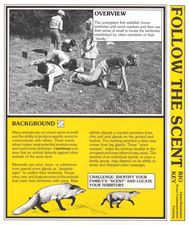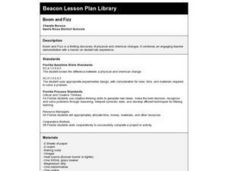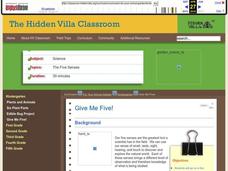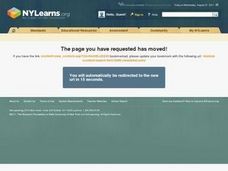Curated OER
Importance of Fresh Vegetables and Fruits in Our Diets
Students explore the importance of fruits and vegetables in our diets. For this science lesson, students discuss various types of fruits and vegetables. Students play the good health=good diet game. Students discuss types of fruits and...
Curated OER
Types of Behavior: Animal Behavior Research
How does one determine what influences animal behavior; Is it nature or nurture? After a short reading explaining different types of conditioning and other learned behaviors, scholars examine six scenarios to determine whether the...
Curated OER
Science Experiments with Eggs
ESL students experiment with eggs to learn the science concepts and science process language.
Curated OER
Follow the Scent
Learners explore animal characteristics by participating in a hunting activity. In this smells lesson, students discuss how animals track each other through a keen sense of smell and how humans rarely do the same. Learners utilize...
Curated OER
How Do People Use Their Parts?
In this senses worksheet, students complete a graphic organizer by describing what a person uses its hands, eyes, mouth, ears, and nose to do.
Curated OER
Apples, Apples, Apples
Students complete activities using apples that help improve their science, math, and reading skills. In this apple activity, students read the book Apples, Apples Apples and visit an orchard or farmer's market to buy a variety of apples....
Curated OER
Boom and Fizz
Learners investigate the differences between a physical and chemical change. They observe various demonstrations involving physical or chemical changes, make predictions, and record what they see, hear, and smell.
Curated OER
Use Your Senses
In this human senses worksheet, students make lists of the things they can see, hear, smell and feel. They compare their own list to a partner's list to earn points.
Curated OER
Five Senses
Students investigate the five senses. In this five senses instructional activity, students read the book My Five Senses and take a barefoot walking trip. Students discuss the experience by describing the smells, sounds, and textures.
Curated OER
All About the Senses
In this senses worksheet, 2nd graders use their sensory receptors to collect information. Students complete short answer questions regarding what they observed, felt, smelled, tasted, and heard with their senses.
Curated OER
The Five Senses of Thanksgiving
In this Thanksgiving worksheet, students write about what they see, hear, smell, taste, and touch on Thanksgiving in different chickens. Students complete 5 chickens about their senses.
Center for Learning in Action
Gases
Explore the properties of gases through one activity and two investigations in which super scientists observe the changes gas makes when encountering different conditions.
Curated OER
Give Me Five!
Students become familiar with their five senses and how their experiences would change without them. In this observations lesson, students observe using their five senses in a garden. Students illustrate what they've observed and share...
Curated OER
Reading Comprehension 4: level 9
Whether you use this reading comprehension worksheet as the basis for a short lesson on comprehension strategies or for additional practice, the passage about tricky octopi is sure to engage the interest of your young scientists.
Curated OER
Salmon Homing Instincts
Students study the conditions of salmon imprinting as the fish returns to spawn in its native waters. Scented cards are used to mimic the imprinting process as the student fishes search for and identify obstacles to reaching their native...
Curated OER
In Touch with Apples
Students read "How To Make an Apple Pie and See the World", the story of a girl who traveled the world to find the ingredients to make her apple pie. They conduct a series of interdisciplinary activities including testing their senses,...
Curated OER
Human Parts
Very young learners who are studying the human body will use this worksheet to identify certain body parts. A cartoon drawing of a boy is shown, and learners must draw lines matching up words such as arm, tummy, foot, and toes to the...
Curated OER
Being Alive
Young biologists use a activity to fill in the blanks of five sentences. Each one needs a word from a word band at the top of the resource. All of the sentences are about things that are alive, and how we know they are alive. The words...
Curated OER
Exploring Learned and Innate Behavior
Middle schoolers explore the differences between learned and innate behavior among humans and monkeys. They complete an assignment and read articles about two studies, which used similar test methods to show that infants and monkeys...
Curated OER
How Does the Air Get Polluted?
Students listen to or read a story that introduces awareness of environmental issues and in particular pollution.
Curated OER
Build Your Own Insect Trap
Learners ask testable questions. They explain the relationship between insect behavior and insect trapping techniques. Students design their own insect traps to collect a new unknown insect, in the same way that entomologists collect the...
Curated OER
Liquid Rainbow
Learners develop their own techniques for drawing a small sample of solutions into a straw. They hypothesize ways to increase the density of water, and discuss how salt-free rainwater tends to float on top of salty seawater.
Curated OER
The Circulatory System--Part III
Learners research the process for the preparation of a soup. Students explore the safety issues of food preparation. Learners, after presenting their soups to the class, will eat their soups that they have prepared.
Curated OER
Stream Scanners
Students investigate quality of water in a stream, lake, or pond by examining chemical, physical, and biological characteristics.




